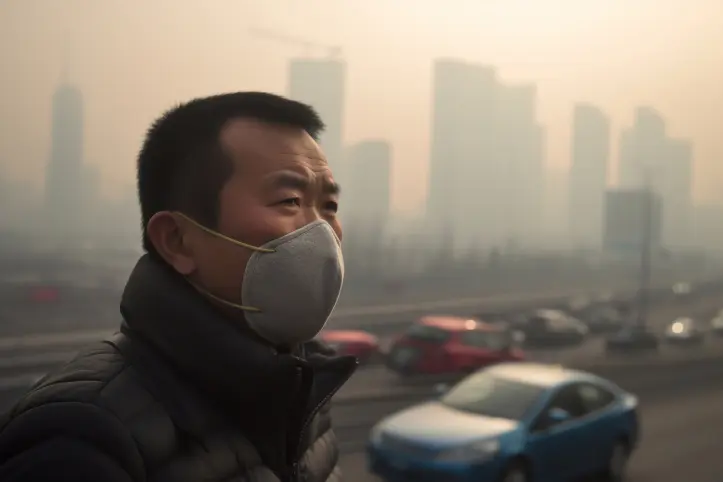India is a popular tourist destination, with a rich culture, diverse landscapes, and stunning historical sites. However, air pollution is a major problem in India, and it is having a significant impact on the tourism sector.
Why is air pollution a problem for India’s tourism sector?
Air pollution can have a negative impact on tourists in a number of ways. It can make it difficult to breathe and exercise, and it can cause a range of health problems, including respiratory infections, heart disease, and cancer. Air pollution can also reduce visibility, making it difficult to enjoy the scenery and attractions.
In addition, air pollution can damage historical sites and monuments. The pollutants in the air can react with the materials used to construct these sites, causing them to erode and deteriorate.
What are the specific impacts of air pollution on India’s tourism sector?
Air pollution is having a number of negative impacts on India’s tourism sector, including:
- A decline in tourist arrivals: According to a study by the World Bank, air pollution is costing India’s tourism sector $1.7 billion every year. The study found that air pollution is deterring tourists from visiting India, and it is also causing tourists to shorten their stay.
- A loss of revenue for the tourism sector: The decline in tourist arrivals is leading to a loss of revenue for the tourism sector. This is impacting hotels, restaurants, tour operators, and other businesses that rely on tourism.
- Damage to India’s reputation as a tourist destination: Air pollution is damaging India’s reputation as a tourist destination. Tourists are increasingly looking for sustainable and healthy travel destinations, and India’s air pollution problem is making it less attractive.
- Health problems for tourists: Air pollution can cause a range of health problems for tourists, including respiratory infections, asthma attacks, and heart problems. This can lead to hospitalizations and even deaths.
- Reduced enjoyment of the tourist experience: Air pollution can reduce tourists’ enjoyment of the tourist experience. It can make it difficult to breathe and exercise, and it can reduce visibility. This can make it difficult to enjoy the scenery and attractions.

What can be done to reduce the impact of air pollution on India’s tourism sector?
There are a number of things that can be done to reduce the impact of air pollution on India’s tourism sector. These include:
- Reducing air pollution levels: The Indian government is taking steps to reduce air pollution levels, such as introducing stricter emissions standards for vehicles and industries. However, more needs to be done to tackle the problem.
- Promoting sustainable tourism: The Indian government can promote sustainable tourism practices, such as encouraging tourists to use public transportation and to visit less polluted destinations.
- Educating tourists about air pollution: The Indian government can educate tourists about the dangers of air pollution and provide them with tips on how to stay safe.
Tourists can also play a role in reducing the impact of air pollution on India. They can do this by:
- Choosing sustainable travel options: Tourists can choose to travel by public transportation, walk, or cycle instead of using taxis or private cars.
- Visiting less polluted destinations: Tourists can avoid visiting destinations that are known to have high levels of air pollution.
- Reducing their own emissions: Tourists can reduce their own emissions by staying in eco-friendly hotels, eating at restaurants that use local and seasonal ingredients, and avoiding unnecessary shopping.
By working together, the Indian government, the tourism sector, and tourists can reduce the impact of air pollution on India’s tourism sector. This will help to protect the health of tourists and residents alike, and it will also help to preserve India’s rich cultural heritage.
Here are some additional thoughts on the impact of air pollution on India’s tourism sector:
- Air pollution can also impact the tourism sector indirectly. For example, it can lead to a decline in agricultural productivity, which can make it more difficult for hotels and restaurants to obtain fresh food. Air pollution can also damage infrastructure, such as roads and airports, which can make it more difficult for tourists to travel around the country.
- The impact of air pollution on the tourism sector is particularly severe in India’s major cities, such as Delhi, Mumbai, and Kolkata. These cities are home to many of India’s most popular tourist attractions, but they also have some of the highest levels of air pollution in the world.
- The impact of air pollution on the tourism sector is also a concern for the Indian government. The tourism sector is a major contributor to the Indian economy, and the government is keen to attract more tourists to the country. However, the air pollution problem is making it more difficult to achieve this goal.
This post is also available in:
![]() Global
Global ![]() IND English
IND English ![]() UK English
UK English ![]() US English
US English